U.S. and Israel Guilty of War Crimes
• Arabs Meet to Discuss Strategy to Bring Goldstone Report to UN General Assembly
•
Non-Aligned Movement Calls on Security Council to Hold Israel Responsible for Gaza Crimes
• Jewish Appeal to Support the Goldstone Report
For Your Information
•
Excerpts from the Goldstone Report
• U.S. Statement to the UNHRC’s Twelfth Special Session in Response to the Goldstone Report
• Statement of Israeli President on the Goldstone Mission Report
Arabs Meet to Discuss Strategy to Bring Goldstone Report to UN General Assembly
The Arab group of the Non-Aligned Movement (NAM) has held discussion on the "most appropriate procedure" to bring Justice Richard Goldstone's report on the Israeli war on Gaza last winter to the attention of the United Nations (UN) General Assembly and the Security Council and ways to implement its recommendations.
"We debated how best we can serve the objectives of the report and we specified certain steps that should be taken at the level of the Security Council, the General Assembly at its present session, and the Secretary-General," Abdelmahmoud Mohamad, Sudanese UN envoy and the group's current chairman, told reporters following the meeting late Monday.
"We are pursuing all these tracks and we will continue to benefit from all of them because of the gravity of the situation and the urgency that we have to deal with this issue," he added.
He said Monday's meeting is "just a step" that will be followed by many meetings to make sure the recommendations contained in the Goldstone report are "operationalized."
He added that the group debated the outcome of the UN Human Rights Council (UNHRC) meeting in Geneva last Friday regarding the Goldstone report, and the group expressed "in no ambiguous terms its full commitment to that report and its happiness that the HRC was able to pass a resolution in that regard."
Palestinian UN envoy Riyad Mansour told reporters following the meeting that an Arab delegation will meet with the General Assembly President Ali Treki this week to discuss "all the options available to us. Based on those discussions, we will see what would be the most appropriate procedure and path to follow and under what item."
The Arab delegation will also meet with the Secretary-General soon to "find out from him exactly what he intends to do," he said.
The UNHRC adopted a resolution last Friday in Geneva endorsing the recommendations contained in the Goldstone report and calling on all concerned parties, including UN bodies, to ensure their implementation in accordance with their respective mandates.
It further recommended that the General Assembly consider the report during the main part of its current 64th session, which ends in mid December.
The Goldstone report recommended that the UNHRC request the Secretary-General to bring the report to the attention of the Security Council so that it may consider action, and that it submit the report to the General Assembly for consideration.
A UN official said that the UN Legal Office believes that the UNHRC is a subsidiary body of the General Assembly, therefore it cannot recommend to the Secretary-General to do anything. The request has to come from the General Assembly itself.
Goldstone accused Israel and Hamas militants in his report of committing war crimes during the Israeli incursion into the Strip last winter. He suggested that they both investigate themselves seriously.
If no credible investigation takes place within six months, the council should refer the issue to the International Criminal Court (ICC).
(Non-Aligned Movement News Network, NNN)
[TOP]
Non-Aligned Movement Calls on Security Council to Hold Israel Responsible for Gaza Crimes
 The 115 countries of the Non-aligned Movement (NAM) have called on the UN Security Council to hold Israel responsible for atrocities committed in Gaza during its offensive.
The 115 countries of the Non-aligned Movement (NAM) have called on the UN Security Council to hold Israel responsible for atrocities committed in Gaza during its offensive.
NAM Ambassador Maged Abdelaziz asked the Security Council on October 14 to "seriously consider and act upon the recommendations" of the UN Fact Finding Mission headed by Richard Goldstone. The move comes while the U.S. administration was planning to stall efforts by the countries to condemn Israel. Washington says the war crime charges in the Goldstone report should be dealt with in the Human Rights Council, not the Security Council.
The Security Council decided to review the issue in its October 14 meeting despite the U.S. pressure. However, the attempts by Washington to stall the process sparked outrage by rights groups.
"That President Obama is receiving the Noble Peace prize after his failure to speak out during the Gaza war, and after his administration's protection of a state that has committed war crimes, is an abomination," Michael Ratner, president of the New York-based Center for Constitutional Rights, told Inter Press Service. U.S. “conduct at the Human Rights Council [in Geneva] where it called the Goldstone report deeply flawed shows that it will again do all in its power to try and bury any investigation of Israel for war crimes," he added. Ratner warned that such moves would embolden Israel to continue its atrocities.
The failure to refer the Gaza matter to the International Criminal Court (ICC) undercuts any claim that the law is applied equally to Israel and the Palestinians.
(Press TV, October 15)
[TOP]
Appeal for Action
on Goldstone Gaza War Crimes Report
Sign on to the U.S. Palestine Community Network's statement calling for U.N. action on the Goldstone report on Israeli War Crimes in Gaza.
On October 16, the United Nation's Human Rights Council in Geneva voted to endorse the report of the Fact-Finding Mission on the Gaza Conflict headed by Justice Richard Goldstone. The vote came after U.S. efforts to block it at the UNHRC (see VOR Update October 19).
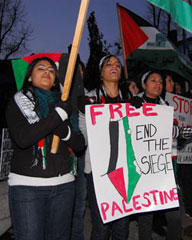 The Goldstone Report addressed human rights and international law violations during Israel's three week military operation against Gaza, between December 27, 2008 and January 18, 2009. It documented Israel's crimes of collective punishment and war crimes. The report calls for the UN Security Council (UNSC) to take up the report and to refer the matter to the International Criminal Court if the Israelis or Palestinians fail to investigate the crimes documented. It is expected that the UN General Assembly will discuss the Goldstone Report by December and also refer it to the UNSC.
The Goldstone Report addressed human rights and international law violations during Israel's three week military operation against Gaza, between December 27, 2008 and January 18, 2009. It documented Israel's crimes of collective punishment and war crimes. The report calls for the UN Security Council (UNSC) to take up the report and to refer the matter to the International Criminal Court if the Israelis or Palestinians fail to investigate the crimes documented. It is expected that the UN General Assembly will discuss the Goldstone Report by December and also refer it to the UNSC.
More than 750 organizations and individuals from around the world have already signed on to an appeal from the U.S. Palestine Community Network demanding action on the Goldstone report. The appeal is below and can be signed at www.palestineconference.org/un-letter.shtml.
* * *
To: His Excellency Ban Ki-moon
Secretary-General
The United Nations
1 United Nations Plaza
New York, New York 10017-3515
cc: UN Security Council President H.E. Ambassador Le Luong Minh, Permanent Representative of Viet Nam; United Nations High Commissioner for Human Rights Navanethem Pillay; President Barack Obama, Secretary of State Hillary Clinton, Vice President Joe Biden, Congressional leaders, the U.N. General Assembly President, members of the U.N. Security Council, U.N. member states, the President, Prime Minister, Cabinet and Opposition leader of Israel, major media representatives and the International Red Cross
Dear Mr. Secretary-General:
I add my name to the over 750 international organizations and groups that have signed on to the following statement from the U.S. Palestine Community Network:
We, the undersigned organizations, institutions, and individuals, are writing to demand the full implementation of the recommendations of the "Report of the United Nations Fact Finding Mission on the Gaza Conflict," and to express our deepest concern and strong condemnation of the premeditated prevention of endorsing the Report at the UN Human Rights Council's twelfth session. It is the responsibility of the UN and the international community to put an end to the excessive and ongoing violation of international law, human rights law and international humanitarian law by the Israeli government and army in Palestine, and to hold the perpetrators accountable to the fullest extent, including prosecution, trial and punishment by the International Criminal Court and international tribunals.
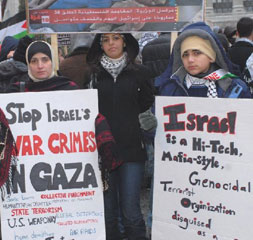 The report, commissioned by the President of the UN Human Rights Council on 3 April 2009, and endorsed by hundreds of human rights and civil society organizations, irrefutably documents the war crimes and crimes against humanity committed by the Israeli military in Gaza with a massive amount of undisputed evidence. It, furthermore, clearly identified specific and practical legally-based recommendations for the UN High Commissioner for Human Rights, UN Security Council, the UN General Assembly and UN Secretary General, Prosecutor of the International Criminal Court, the international Community, and the Government of Israel (A/HRC/12/48: pp 545-554).
The report, commissioned by the President of the UN Human Rights Council on 3 April 2009, and endorsed by hundreds of human rights and civil society organizations, irrefutably documents the war crimes and crimes against humanity committed by the Israeli military in Gaza with a massive amount of undisputed evidence. It, furthermore, clearly identified specific and practical legally-based recommendations for the UN High Commissioner for Human Rights, UN Security Council, the UN General Assembly and UN Secretary General, Prosecutor of the International Criminal Court, the international Community, and the Government of Israel (A/HRC/12/48: pp 545-554).
Pursuant to the text and spirit of international law, human rights law, and international humanitarian law, we demand the full implementation of the report's recommendations including the immediate lifting of the savage and illegal siege on Gaza, the reconstruction of Gaza, and the report's demand that the "Prosecutor of the International Criminal Court acts as expeditiously as possible" (A/HRC/12/48: p: 548). We demand that the UN Secretary General pursues and oversees the full implementation of the report's recommendations and that each respective body identified by the report must carry out its role in implementing these recommendations. Furthermore, the report's own conclusion that there is no equating "the position of Israel as the occupying power with that of the occupied Palestinian population or entities representing it" (A/HRC/12/48: p: 521) is critically important. We reject any attempt to criminalize or equate the resistance of an occupied people to the institutional, state-directed, massive violence of the occupier.
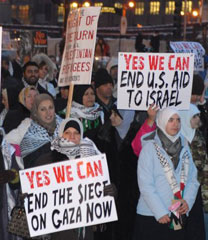 The absence of any serious attempt to stop the Israeli aggression during the war on Gaza was a serious moral failure on the part of the international community. The continuous failure to put an end to the excessive and ongoing suffering of the Palestinians in Gaza that are being kept captives under the immoral and illegal Israeli siege is another moral and legal failure that continues to the present day. The international community and the UN are being tested again and its credibility will come under serious question should it ignore once again the plight of the Palestinian people, and Israeli continuous violations of the international law, human rights law, international humanitarian law, the UN charter, and UN General Assembly and Security Council resolutions.
The absence of any serious attempt to stop the Israeli aggression during the war on Gaza was a serious moral failure on the part of the international community. The continuous failure to put an end to the excessive and ongoing suffering of the Palestinians in Gaza that are being kept captives under the immoral and illegal Israeli siege is another moral and legal failure that continues to the present day. The international community and the UN are being tested again and its credibility will come under serious question should it ignore once again the plight of the Palestinian people, and Israeli continuous violations of the international law, human rights law, international humanitarian law, the UN charter, and UN General Assembly and Security Council resolutions.
The victims of the Israeli atrocities committed in Gaza deserve genuine justice and those responsible must be held accountable. Any delay or lack of progress in implementing the recommendations of the report, combined with the continuing Israeli violations of international law send a message of effective impunity. Only a full implementation of the report's recommendations as a first step towards bringing justice to Gaza's victims could foster genuine peace with justice in the region.
Sincerely,
(Your signature will be appended here based on the contact information you enter in the form above)
Partial list of Organizational Signers:
US Palestine Community Network
Al-Awda, the Palestine Right to Return Coalition - New York
Al-Hewar Center
Al-Nakba Awareness Project
American Iranian Friendship Committee
American Muslims for Palestine
Arab American Union Members Council
Arab Group for the Protection of Nature
Arab Resource and Organizing Center
Architects and Planners for Justice in Palestine
Association Switzerland-Palestine
Bay Area Labor Committee for Peace and Justice
BOYCOTT! Supporting the Palestinian BDS call from Within
Break the Silence Mural Project
Damascus Center for Theoretical and Civil Rights Studies
Executive Office of the Palestinian Community in Germany
Free Gaza Movement, USA
Gaza Mental Health Foundation
Global Women's Strike - Ireland
International Action Center
International Jewish Anti-Zionist Network
International Solidarity Movement - Northern California
Justice for Palestinians
Neolaia Synaspismou, Greece
New York City Labor Against the War
PalCH - Switzerland
Palestinian Youth Network
Rachel Corrie Foundation
Society of the Palestinian Community in Switzerland
Students for Justice in Palestine - UC Berkeley
United for Justice with Peace
Women in Black - Cologne, Germany
[TOP]
Jewish Appeal to Support the Goldstone Report
The following open letter was initiated by Jews Say No! and signed by hundreds of individuals and organizations worldwide. The letter was also sent to Justice Goldstone.
Jewish Appeal to Support the Goldstone Report
The primary author of the recently released UN Report on Gaza, the internationally respected jurist Richard Goldstone, has been attacked by establishment voices within the Jewish community. When those within a community try to "excommunicate" and dishonor truth-tellers, it is our obligation and responsibility to speak out vehemently on their behalf and on behalf of the truth they bring.
By all accounts, Judge Goldstone, who has a deep connection to Israel, approached his task with no pre-conceptions about what he and his team would find as they investigated the circumstances and aftermath of the Israeli attack on Gaza. Goldstone is a former South African constitutional law court judge who also served as a prosecutor of the Yugoslav and Rwandan war crimes tribunals. His credentials for this task are impeccable.
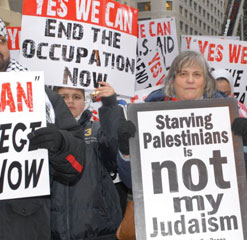 For following where the truth led him and releasing a report detailing human rights abuses and violations of international law by Israel, as well as by Hamas, Judge Goldstone should be applauded for his honesty and integrity. Instead, he and the report have been viciously and relentlessly attacked by many within the Jewish community.
For following where the truth led him and releasing a report detailing human rights abuses and violations of international law by Israel, as well as by Hamas, Judge Goldstone should be applauded for his honesty and integrity. Instead, he and the report have been viciously and relentlessly attacked by many within the Jewish community.
When it comes to Israel, hard-core censorship and intimidation by those claiming to speak in the name of the Jewish people have been the order of the day. Our saying, "Three Jews — four opinions," reflects the traditional Jewish encouragement to argue and debate. However, the reality, sadly, is that diverse opinions are welcome — except when it comes to Israel.
We must hold the Israeli government and the Jewish establishment accountable for attempting to vilify a truth-teller and for suppressing the truth about Israeli government crimes against the Palestinian people. We call upon each and every one of us to speak out at every opportunity — at our community centers and synagogues, in our homes, in the street, wherever we go.
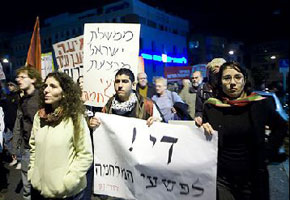 We must demand that the truth be heard and that those claiming to speak in our name stop manipulating truths that have been well-documented for years, long before the Goldstone report. We are also appalled by the Obama Administration's reaction to the report. We call for a fair and impartial investigation of the report's allegations by non-military institutions in Israel. Failing that, we call for an investigation by the International Criminal Court (ICC). Let us begin the New Year in the pursuit of justice.
We must demand that the truth be heard and that those claiming to speak in our name stop manipulating truths that have been well-documented for years, long before the Goldstone report. We are also appalled by the Obama Administration's reaction to the report. We call for a fair and impartial investigation of the report's allegations by non-military institutions in Israel. Failing that, we call for an investigation by the International Criminal Court (ICC). Let us begin the New Year in the pursuit of justice.
Partial list of Signatories:
Jews Say No:
Nicholas Abramson
Elly Bulkin
Nina Felshin
Sherry Gorelick
Jane Hirschmann
Carol Horwitz
Abigail Levine
Alan Levine
Helaine Meisler
Gail Miller
Carol Munter
Donna Nevel
Ray Wofsy
Dorothy Zellner
And hundreds more
U.S. ORGANIZATIONS:
Jews Say No
ICAHD-USA
Jewish Voice for Peace
American Jews for a Just Peace
Jews for a Just Peace, North Carolina
Washington Heights Women in Black
Los Angeles Jews for Peace
Jews for Peace between Israel and Palestine
Bay Area Women in Black
Jewish Voice for Peace, South Bay Chapter
[TOP]
Excerpts from the Goldstone Report
Below we reprint excerpts from the report of the UN Fact Finding Mission on Gaza – known as the Goldstone report. The report is almost 600 pages long. Of that about thirty pages deal with the impact of rockets on Israel, while nearly all the rest addresses Israeli crimes. The number at the beginning of each subsection indicates paragraph number. The full report is available at http://www2.ohchr.org/english/bodies/hrcouncil/docs/12session/A-HRC-12-48.pdf.
1883. The Gaza military operations were, according to the Israeli Government, thoroughly and extensively planned. While the Israeli Government has sought to portray its operations as essentially a response to rocket attacks in the exercise of its right to self-defense, the Mission considers the plan to have been directed, at least in part, at a different target: the people of Gaza as a whole.
1884. In this respect, the operations were in furtherance of an overall policy aimed at punishing the Gaza population for its resilience and for its apparent support for Hamas, and possibly with the intent of forcing a change in such support. The Mission considers this position to be firmly based in fact, bearing in mind what it saw and heard on the ground, what it read in the accounts of soldiers who served in the campaign, and what it heard and read from current and former military officers and political leaders whom the Mission considers to be representative of the thinking that informed the policy and strategy of the military operations.
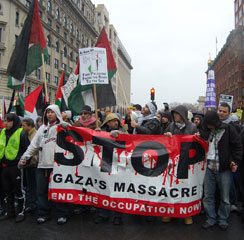 1885. The Mission recognizes that the principal focus in the aftermath of military operations will often be on the people who have been killed – more than 1,400 in just three weeks. This is rightly so. Part of the functions of reports such as this is to attempt, albeit in a very small way, to restore the dignity of those whose rights have been violated in the most fundamental way of all – the arbitrary deprivation of life. It is important that the international community asserts formally and unequivocally that such violence to the most basic fundamental rights and freedoms of individuals should not be overlooked and should be condemned.
1885. The Mission recognizes that the principal focus in the aftermath of military operations will often be on the people who have been killed – more than 1,400 in just three weeks. This is rightly so. Part of the functions of reports such as this is to attempt, albeit in a very small way, to restore the dignity of those whose rights have been violated in the most fundamental way of all – the arbitrary deprivation of life. It is important that the international community asserts formally and unequivocally that such violence to the most basic fundamental rights and freedoms of individuals should not be overlooked and should be condemned.
1887. The timing of the first Israeli attack, at 11.30 a.m. on a weekday, when children were returning from school and the streets of Gaza were crowded with people going about their daily business, appears to have been calculated to create the greatest disruption and widespread panic among the civilian population. The treatment of many civilians detained or even killed while trying to surrender is one manifestation of the way in which the effective rules of engagement, standard operating procedures and instructions to the troops on the ground appear to have been framed in order to create an environment in which due regard for civilian lives and basic human dignity was replaced with disregard for basic international humanitarian law and human rights norms.
1889. The repeated failure to distinguish between combatants and civilians appears to the Mission to have been the result of deliberate guidance issued to [Israeli] soldiers, as described by some of them, and not the result of occasional lapses.
1894. The Mission has noted with concern public statements by Israeli officials, including senior military officials, to the effect that the use of disproportionate force, attacks on civilian population and the destruction of civilian property are legitimate means to achieve Israel’s military and political objectives. The Mission believes that such statements not only undermine the entire regime of international law, they are inconsistent with the spirit of the Charter of the United Nations and, therefore, deserve to be categorically denounced.
 1897. As the Mission focused on investigating and analyzing the specific matters within its mandate, Israel’s continuing occupation of the Gaza Strip and the West Bank emerged as the fundamental factor underlying violations of international humanitarian and human rights law against the protected population and undermining prospects for development and peace. Israel’s failure to acknowledge and exercise its responsibilities as the occupying power further exacerbated the effects of occupation on the Palestinian people, and continue to do so. Furthermore, the harsh and unlawful practices of occupation, far from quelling resistance, breed it, including its violent manifestations. The Mission is of the view that ending occupation is a prerequisite for the return of a dignified life for Palestinians, as well as development and a peaceful solution to the conflict.
1897. As the Mission focused on investigating and analyzing the specific matters within its mandate, Israel’s continuing occupation of the Gaza Strip and the West Bank emerged as the fundamental factor underlying violations of international humanitarian and human rights law against the protected population and undermining prospects for development and peace. Israel’s failure to acknowledge and exercise its responsibilities as the occupying power further exacerbated the effects of occupation on the Palestinian people, and continue to do so. Furthermore, the harsh and unlawful practices of occupation, far from quelling resistance, breed it, including its violent manifestations. The Mission is of the view that ending occupation is a prerequisite for the return of a dignified life for Palestinians, as well as development and a peaceful solution to the conflict.
1912. International law sets obligations on States not only to respect but also to ensure respect for international humanitarian law. The International Court of Justice stated in its Advisory Opinion on the Legal Consequences of the Construction of a Wall in the Occupied Palestinian Territory that “all States parties to the Fourth Geneva Convention relative to the Protection of Civilian Persons in Time of War of 12 August 1949 have in addition the obligation, while respecting the United Nations Charter and international law, to ensure compliance by Israel with international humanitarian law as embodied in that Convention."
1916. The Security Council has placed the protection of civilian populations on its agenda as a regular item, recognizing it as a matter falling within its responsibility. The Mission notes that the international community has been largely silent and has to date failed to act to ensure the protection of the civilian population in the Gaza Strip and generally the Occupied Palestinian Territory. Suffice it to notice the lack of adequate reaction to the blockade and its consequences, to the Gaza military operations and, in their aftermath, to the continuing obstacles to reconstruction. The Mission also considers that the isolation of the Gaza authorities and the sanctions against the Gaza Strip have had a negative impact on the protection of the population.
1919. The Mission finds that in a number of cases Israel failed to take feasible precautions required by customary law reflected in article 57 (2) (a) (ii) of Additional Protocol I to avoid or minimize incidental loss of civilian life, injury to civilians and damage to civilian objects. The firing of white phosphorus shells over the UNRWA compound in Gaza City is one of such cases in which precautions were not taken in the choice of weapons and methods in the attack, and these facts were compounded by reckless disregard for the consequences. The intentional strike at al-Quds hospital using high-explosive artillery shells and white phosphorous in and around the hospital also violated articles 18 and 19 of the Fourth Geneva Convention. With regard to the attack against al-Wafa hospital, the Mission found a violation of the same provisions, as well as a violation of the customary law prohibition against attacks which may be expected to cause excessive damage to civilians and civilian objects.
1923. The Mission also concludes that Israel, by deliberately attacking police stations and killing large numbers of policemen (99 in the incidents investigated by the Mission) during the first minutes of the military operations, failed to respect the principle of proportionality between the military advantage anticipated by killing some policemen who might have been members of Palestinian armed groups and the loss of civilian life (the majority of policemen and members of the public present in the police stations or nearby during the attack). Therefore, these were disproportionate attacks in violation of customary international law. The Mission finds a violation of the right to life (ICCPR [International Covenant on Civil and Political Rights], article 6) of the policemen killed in these attacks who were not members of Palestinian armed groups.
1925. The Mission investigated several incidents in which the Israeli armed forces used local Palestinian residents to enter houses which might be booby-trapped or harbor enemy combatants (this practice, known in the West Bank as “neighbor procedure,” was called “Johnnie procedure” during the military operations in Gaza). The Mission found that the practice constitutes the use of human shields prohibited by international humanitarian law. It further constitutes a violation of the right to life, protected in article 6 of ICCPR, and of the prohibition against cruel and inhuman treatment in its article 7.
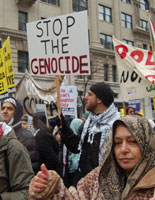 1929. The Mission also finds that the Israeli armed forces unlawfully and wantonly attacked and destroyed without military necessity a number of food production or food-processing objects and facilities (including mills, land and greenhouses), drinking-water installations, farms and animals in violation of the principle of distinction.
1929. The Mission also finds that the Israeli armed forces unlawfully and wantonly attacked and destroyed without military necessity a number of food production or food-processing objects and facilities (including mills, land and greenhouses), drinking-water installations, farms and animals in violation of the principle of distinction.
1932. The Mission finds that, despite the information circulated by Israel about the humanitarian relief schemes in place during the military operations, Israel has essentially violated its obligation to allow free passage of all consignments of medical and hospital objects, food and clothing that were needed to meet the urgent humanitarian needs of the civilian population in the context of the military operations, which is in violation of article 23 of the Fourth Geneva Convention.
1936. The Mission further considers that the series of acts that deprive Palestinians in the Gaza Strip of their means of subsistence, employment, housing and water, that deny their freedom of movement and their right to leave and enter their own country, that limit their rights to access a court of law and an effective remedy, could lead a competent court to find that the crime of persecution, a crime against humanity, has been committed.
1937. With regard to acts of violence by settlers against Palestinians [in the West Bank], the Mission concludes that Israel has failed to fulfill its international obligations to protect the Palestinians from violence by private individuals under both international human rights law and international humanitarian law. In some instances security forces acquiesced to the acts of violence in violation of the prohibition against cruel, inhuman or degrading treatment. When this acquiescence occurs only in respect of violence against Palestinians by settlers and not vice versa, it would amount to discrimination on the basis of national origin.
1943. The Mission finds that the detention of members of the Palestinian Legislative Council by Israel violates the right not to be arbitrarily detained, as protected by article 9 of ICCPR. Insofar as it is based on political affiliation and prevents those members from participating in the conduct of public affairs, it is also in violation of its articles 25 recognizing the right to take part in public affairs and 26, which provides for the right to equal protection under the law. Insofar as their detention is unrelated to their individual behavior, it constitutes collective punishment, prohibited by article 33 of the Fourth Geneva Convention. Information on the detention of large numbers of children and their treatment by Israeli security forces point to violations of their rights under ICCPR and the Convention on the Rights of the Child.
1953. The Mission found no evidence to suggest that Palestinian armed groups either directed civilians to areas where attacks were being launched or that they forced civilians to remain within the vicinity of the attacks. The Mission also found no evidence that members of Palestinian armed groups engaged in combat in civilian dress. Although in the one incident of an Israeli attack on a mosque it investigated the Mission found that there was no indication that that mosque was used for military purposes or to shield military activities, the Mission cannot exclude that this might have occurred in other cases.
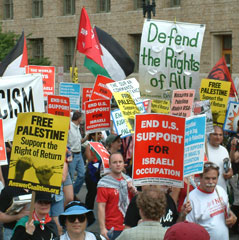 1957. The Mission was struck by the repeated comment of Palestinian victims, human rights defenders, civil society interlocutors and officials that they hoped that this would be the last investigative mission of its kind, because action for justice would follow from it. It was struck, as well, by the comment that every time a report is published and no action follows, this “emboldens Israel and her conviction of being untouchable.” To deny modes of accountability reinforces impunity, and tarnishes the credibility of the United Nations and of the international community. The Mission believes these comments ought to be at the forefront in the consideration by Members States and United Nations bodies of its findings and recommendations and action consequent upon them.
1957. The Mission was struck by the repeated comment of Palestinian victims, human rights defenders, civil society interlocutors and officials that they hoped that this would be the last investigative mission of its kind, because action for justice would follow from it. It was struck, as well, by the comment that every time a report is published and no action follows, this “emboldens Israel and her conviction of being untouchable.” To deny modes of accountability reinforces impunity, and tarnishes the credibility of the United Nations and of the international community. The Mission believes these comments ought to be at the forefront in the consideration by Members States and United Nations bodies of its findings and recommendations and action consequent upon them.
1959. After reviewing Israel’s system of investigation and prosecution of serious violations of human rights and humanitarian law, in particular of suspected war crimes and crimes against humanity, the Mission found major structural flaws that, in its view, make the system inconsistent with international standards. With military “operational debriefings” at the core of the system, there is no effective and impartial investigation mechanism and victims of such alleged violations are deprived of any effective or prompt remedy. Furthermore, such investigations, being internal to the Israeli military authority, do not comply with international standards of independence and impartiality.
[TOP]
U.S. Statement to the UNHRC’s Twelfth Special Session in Response to the Goldstone Report
Below is the response of the U.S. government to the Goldstone report on Gaza, delivered to the United Nations Human Rights Commission (UNHRC) by Michael Posner, Assistant Secretary of State for Democracy, Human Rights and Labor.
I appreciate the opportunity to address the Council with respect to the report of the United Nations Fact-Finding Mission on the Gaza Conflict. This is my first appearance before the Human Rights Council representing the United States as the new Assistant Secretary of State for Democracy, Human Rights, and Labor. I want to set my comments about this report in a broader context. Earlier this year President Barack Obama expressed his deep concern over the loss of life and humanitarian suffering in both Israel and Gaza. He has also made clear his abiding commitment to comprehensive peace in the Middle East, in which two states, Israel and Palestine, live side by side in peace and security.
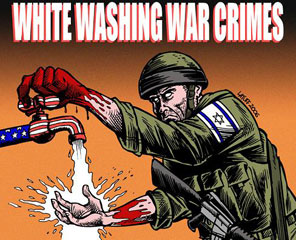 We have approached this report applying broad principles. First, we are ready to engage in the discussion of this report and the broader issues relating to Israel and the Palestinians in a fair and honest way. Although we believe that the document is deeply flawed and disagree sharply with its methodology and many of its recommendations, including their extraordinarily broad scope, we recognize Justice Goldstone’s distinguished record of public service in his own country, South Africa, and in the larger global efforts to promote justice — in the former Yugoslavia, in Rwanda, and elsewhere.
We have approached this report applying broad principles. First, we are ready to engage in the discussion of this report and the broader issues relating to Israel and the Palestinians in a fair and honest way. Although we believe that the document is deeply flawed and disagree sharply with its methodology and many of its recommendations, including their extraordinarily broad scope, we recognize Justice Goldstone’s distinguished record of public service in his own country, South Africa, and in the larger global efforts to promote justice — in the former Yugoslavia, in Rwanda, and elsewhere.
In engaging in discussions over this report, we must step back and take issue with the grossly disproportionate attention the Council pays to one country, Israel. When the United States decided to seek a seat on the Council, we stated our clear intention to address this lack of balance in the Council’s proceedings. We urge our fellow members to join us in firmly rejecting this double standard. This is a high priority for us, one which we believe needs to be addressed now. Israel is the only country that has its own agenda item at this Council. In the past 5 years, the Council and its predecessor organization, the UN Commission on Human Rights, have commissioned more than 20 reports on Israel, far more than any other country in the world. Since the Council was created in 2006, it has passed 20 resolutions on Israel, more than the number of resolutions for all 191 other UN members combined. The Council also has held 11 special sessions, 5 focused exclusively on Israel. This is unfair, and it prevents the Council from devoting adequate time and attention to many other situations around the world that deserve our attention. We hope that Council members will join us in approaching the important work of this Council in a new, constructive spirit that does not seek to vilify any particular UN member nation.
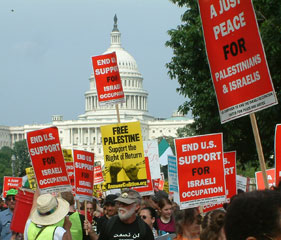 Second, we are guided by our commitment to the universal application of international law, including humanitarian law and human rights law, in assessing the findings and recommendations of this report, but that cannot be understood to imply a moral equivalence between Israel, a democratic state with the right of self-defense, and the terrorist group Hamas, that responded to Israel’s pull-out of Gaza by terrorizing civilians in southern Israel. The report includes a number of very serious allegations charging Israel and the Palestinians with violations of human rights and humanitarian law. We take these allegations seriously. We are confident that Israel, as a democracy with a well-established commitment to rule of law, has the institutions and ability to carry out robust investigations into these allegations. We note that Israel has stated publicly it has already investigated at least 100 complaints related to the Gaza conflict, including about some incidents mentioned in the report, and is currently pursuing action in 23 individual cases. The findings from each of its investigations is subject to multiple independent layers of review. We encourage Israel to utilize appropriate domestic review procedures and meaningful accountability mechanisms to investigate and address all credible allegations of misconduct or violations of international law. Hamas, a terrorist group that has seized control of a territory, has neither democratic structures, nor an independent judiciary, nor willingness to examine its own violations of international humanitarian law and human rights law. Nevertheless, this body should certainly demand from Hamas that it do so, as well as demand an end to Hamas’ deliberate targeting of civilians and its use of its own population as human shields. This body also should ask the Palestinian Authority to carry out its own investigation into Hamas’ violations of international law.
Second, we are guided by our commitment to the universal application of international law, including humanitarian law and human rights law, in assessing the findings and recommendations of this report, but that cannot be understood to imply a moral equivalence between Israel, a democratic state with the right of self-defense, and the terrorist group Hamas, that responded to Israel’s pull-out of Gaza by terrorizing civilians in southern Israel. The report includes a number of very serious allegations charging Israel and the Palestinians with violations of human rights and humanitarian law. We take these allegations seriously. We are confident that Israel, as a democracy with a well-established commitment to rule of law, has the institutions and ability to carry out robust investigations into these allegations. We note that Israel has stated publicly it has already investigated at least 100 complaints related to the Gaza conflict, including about some incidents mentioned in the report, and is currently pursuing action in 23 individual cases. The findings from each of its investigations is subject to multiple independent layers of review. We encourage Israel to utilize appropriate domestic review procedures and meaningful accountability mechanisms to investigate and address all credible allegations of misconduct or violations of international law. Hamas, a terrorist group that has seized control of a territory, has neither democratic structures, nor an independent judiciary, nor willingness to examine its own violations of international humanitarian law and human rights law. Nevertheless, this body should certainly demand from Hamas that it do so, as well as demand an end to Hamas’ deliberate targeting of civilians and its use of its own population as human shields. This body also should ask the Palestinian Authority to carry out its own investigation into Hamas’ violations of international law.
Third, a genuine commitment to the truth should compel this body to discuss the weaknesses of the report. Those weaknesses will appear clearer to those who actually have read the full report and understood its implications. The report makes extraordinarily negative inferences about the intentions of Israeli military commanders, senior political leaders, and the entire Israeli criminal justice system on the basis of a limited factual record and from those inferences draws condemnatory conclusions of law, treating accusations and inferences as fact. One example is the report’s call for the UN General Assembly to establish an escrow account to which only Palestinians could make compensation claims and which only Israel is required to fund. The report further calls on Israel to undertake a moratorium on the use of certain munitions; it makes no such demand of Hamas with regard to its use of indiscriminate rockets. These unbalanced recommendations taint many of the report’s suggestions for international action.
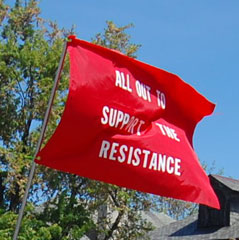 Another significant problem with the report is its failure to deal adequately with the asymmetrical nature of this conflict or assign appropriate responsibility to Hamas for its decision to base itself and its military operations in heavily civilian-populated urban areas. The conflict in Gaza is emblematic of a new kind of conflict in our world, where some of those engaged in combat use civilian spaces — schools, hospitals and religious institutions — to store weapons and as staging grounds for rocket attacks and armed combat. National militaries engaged in asymmetrical warfare must remain bound by humanitarian law, but it is a stark and tragic reality that terrorists systematically ignore these laws. Actions by terrorist groups that have the effect of employing civilians as human shields put enormous pressures on militaries that are trying to protect civilians and their own soldiers, an issue faced by many militaries today. Although the Goldstone report deals briefly with these issues, its findings of fact and law are tentative and equivocating.
Another significant problem with the report is its failure to deal adequately with the asymmetrical nature of this conflict or assign appropriate responsibility to Hamas for its decision to base itself and its military operations in heavily civilian-populated urban areas. The conflict in Gaza is emblematic of a new kind of conflict in our world, where some of those engaged in combat use civilian spaces — schools, hospitals and religious institutions — to store weapons and as staging grounds for rocket attacks and armed combat. National militaries engaged in asymmetrical warfare must remain bound by humanitarian law, but it is a stark and tragic reality that terrorists systematically ignore these laws. Actions by terrorist groups that have the effect of employing civilians as human shields put enormous pressures on militaries that are trying to protect civilians and their own soldiers, an issue faced by many militaries today. Although the Goldstone report deals briefly with these issues, its findings of fact and law are tentative and equivocating.
We also have very serious concerns about the recommendations spelled out in this report, especially that these allegations be taken up by the UN Security Council and then possibly referred to the International Criminal Court. The role of the Human Rights Council would be dramatically different if this approach were to be applied in every conflict situation around the world where there are alleged violations of human rights or humanitarian law.
We urge members of this Council to commit with us to pass a consensus resolution that encourages Israel to investigate and address allegations in the Report thoroughly through credible domestic processes. It should also call on the Palestinians to launch credible investigations to address allegations of Hamas abuses and demand that Hamas stop its clear violations. If undertaken properly and fairly, these reviews can serve as important confidence building measures that will support our larger, essential objective, which is our shared quest for a just and lasting peace in the Middle East.
[TOP]
Statement of Israeli President on the Goldstone Mission Report
The following is a statement issued by Israeli President Shimon Peres in response to the report of the UN Fact Finding Mission on the Gaza Conflict.
The Goldstone Mission report is a mockery of history. It fails to distinguish between the aggressor and a state exercising its right for self-defense. War itself is a crime. The aggressor is the criminal. The side exercising self-defense has no other alternative.
The Hamas terrorist organization has opened war and perpetrated other horrible crimes. For years, Hamas carried out attacks against the children of Israel, sending suicide bombers into city centers, injuring and killing civilians. They fired over 12,000 rockets and mortar shells at towns and villages with one clear aim — to kill innocent civilians.
The report legitimizes terrorist activity, the pursuit of murder and death. The report disregards the duty and right of self-defense, held by every sovereign state as enshrined in the UN Charter.
Israel withdrew all of its troops and settlers from the Gaza Strip, opened the border crossings and actively supported its reconstruction. The Israeli presence in Gaza was terminated. But after Israel completed its redeployment from Gaza, a murderous and illegitimate terror group violently revolted against the legitimate Fatah leadership, overthrowing it by force.
Hamas operatives murdered Fatah leaders, at times throwing them from rooftops in broad daylight. While Hamas continued firing, Israel employed, time and time again, the diplomatic channels, including many appeals to the UN — in an attempt to bring about a cessation of rocket fire.
Israel redeployed and terminated its presence in Gaza. Hamas responded with incessant rocket fire aimed at killing children, women and innocent civilians. Instead of building Gaza and caring for the welfare of its citizens, Hamas built tunnels to attack Israel, cruelly using children and innocent Palestinians to hide terrorists and ammunition.
Hamas terrorists built rocket launching pads and storage facilities near schools, in mosques and kindergartens. They booby-trapped urban neighborhoods and used Palestinian children as human-shields in order to hide terrorists and war materiel.
The State of Israel was forced to defend itself. It acted out of obligation to its citizens, like any sister state in the family of nations would.
Israel has been criticized for its actions against Hizbullah attacks from Lebanon and Hamas attacks from the Gaza Strip, as well as for building the security barrier in the West Bank to prevent suicide bombers from entering the country.
This criticism did not stop the rockets from hitting the South and the North, nor did it stop terrorists from blowing themselves up in our central cities. IDF operations enabled economic prosperity in the West Bank, relieved southern Lebanese citizens from the terror of Hezbollah and have enabled Gazans to have normal lives again.
Those in pursuit of peace have justice on their side. Those who monger war will forever be criminals. Members of the Goldstone Mission would have never compiled such a report if their children resided in Sderot and suffered the terrorism of daily rocket fire.
[TOP]
